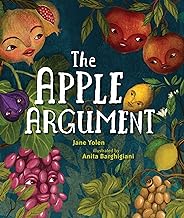The Apple Argument by Jane Yolen with illustrations by Anita Barghigiani; Minneapolis: Kar-Ben Publishing; © 2023; ISBN 9781728-486451; 30 pages; $18.99.

 SAN DIEGO – This book for children between the ages of 3 and 7 is easy enough to read but more difficult to understand why it was written in the first place. What lesson does its author want to teach?
SAN DIEGO – This book for children between the ages of 3 and 7 is easy enough to read but more difficult to understand why it was written in the first place. What lesson does its author want to teach?
It posits that before it was relocated to Earth, the Garden of Eden—with a man and a woman, the snake, and its fruits and vegetables—all existed on an unnamed planet. There, the fruits each laid claim to being the best. The apple boasted it was the “hardiest”; the pomegranate, the “biggest”; the grape, the “sweetest”; the fig, “the yummiest” and the citron (lemon) because it could make any of them taste better with just one drop.
God grew tired of hearing their quarreling, so put a man and a woman in this garden to be caretakers; telling them they could eat the vegetables on the ground, but must refrain from eating the fruit from the trees. However, the vegetables required tending, whereas the fruits were easy to reach and delicious. The snake told them to go ahead and eat the fruit.
The fruit, in league with the snake, wanted to be eaten because respectively one was hardiest, and others biggest, sweetest, yummiest, and able to make any of them taste better. When God saw what was afoot, he transferred the garden and its inhabitants to Earth, where fruits no longer grew year round, and gardening became hard work.
Today, people are like the fruits. Some are hardy, some sweet, some have good taste, others don’t and some make all of us a little but better. So what is the lesson here? That like the many kinds of fruits, people are diverse? Or perhaps that humanity is naturally quarrelsome?
Did the Garden of Eden need to be transferred from some far, distant planet for this story to hold together? And why did God in this case prohibit the eating of all fruits, instead of just the one from the “Tree of Knowledge”?
How will adults explain all this to young readers?
*
Donald H. Harrison is publisher and editor of San Diego Jewish World. He may be contacted via donald.harrison@sdjewishworld.com